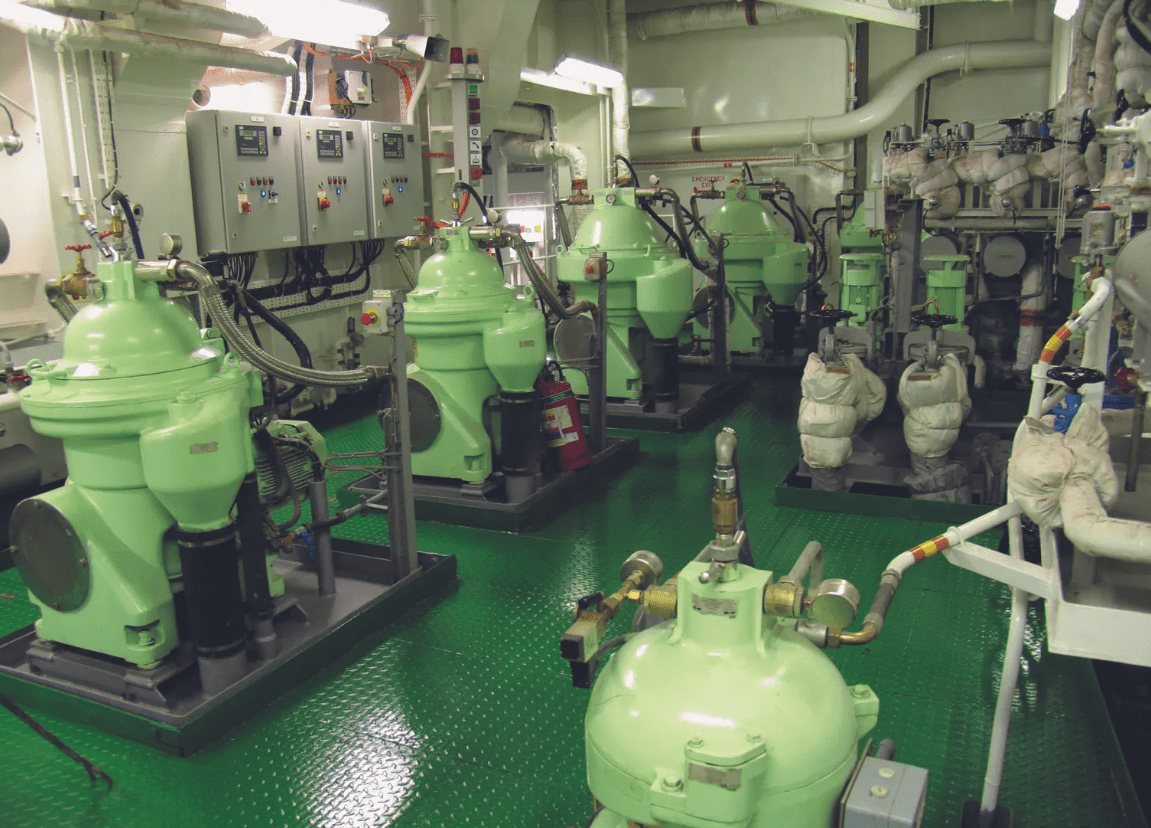
Marine separators play a crucial role in ship operations and other marine vessels. These devices are specifically designed to separate different fluids within the vessels, ensuring the smooth functioning of various onboard systems.
How do marine separators work? Why are they crucial for ships and other marine vessels? This comprehensive guide will provide valuable insights into why they are indispensable for the smooth and reliable operation of marine vessels.
What are marine separators?
Marine separators are sophisticated parts of machinery, commonly used on ships and other marine vessels. They work by using centrifugal force to spin the mixture of oil and impurities at high speeds, causing the denser impurities to move toward the outer edge of the separator bowl and be collected for disposal. This process is very important. Numerous systems and procedures are dependent on the separation of liquids from the moment a ship sets sail. These separators serve as guardians, with the main aim to classify and segregate liquids according to their unique characteristics and intended use.
The denser pollutants flow to the outer edge of the separator bowl and are collected for disposal. In the meantime, the cleaner oil is pulled out of the bowl’s center and redirected to the ship’s engines or storage tanks and electro generators. By preventing impurities from clogging fuel injectors and other crucial components, this procedure helps to ensure the effective and secure running of marine engines.
How do marine separators work?
Centrifuging is a technique that uses centrifugal force to magnify the effects of gravity so that the separation process moves quickly and continuously. It operates by rapidly rotating a bowl containing the liquid to create the centrifugal force needed to induce separation, which allows us to substitute centrifugal force for gravitational force.
Mathematically, this is calculated by: Fs = ∏/6x D3 (ρw-ρo) ω2 r.
Centrifugal marine separators divide fluids with various densities. These separators constitute several discs or vanes and a revolving bowl. The centrifugal force starts when the fluid mixture enters the vessel. Lighter substances, such as oil, tend to collect in the center. At the same time, heavier substances, such as water and solid particles, are driven outward toward the bowl’s walls. The separators also incorporate a discharge system to remove the separated fluids, ensuring continuous operation and preventing any build-up of substances.
The radius of the bowl and the separator’s spinning speed affect the centrifugal force. Marine separators can exert the necessary force for successful fluid separation with different densities. This procedure makes it possible to separate the water, oil, and other materials that are present in marine systems. Also, the separators have disc stacks, which increase the surface area available for fluid separation. They allow the lighter components to rise while the heavier ones settle down; these discs’ narrow channels facilitate the separating process. To ensure constant functioning and prevent any buildup of separated materials, the separators also have a discharge mechanism to evacuate the divided fluids.
Please note that the structure and principle of operation of these vessels may differ depending on the type and application. Some separators may have additional features like heaters to optimize the separation process for specific substances or operating conditions. However, the basic principle of harnessing centrifugal force remains a fundamental aspect of all marine separators.
Why are separators important?
Separators play a vital role in the good functioning of a ship. The reasons they hold immense importance for marine vessels are many. Most of them are below:
Efficiency and performance of the ship
One of the most critical roles of separators is the efficiency and good performance of the onboard systems. These mechanisms ensure that each material stays in its assigned compartment. This avoids cross-contamination, preserves the quality of fluids, and improves the efficiency with which crucial equipment, such as engines and generators, operates. As a result, ships can function effectively, with improved performance and less downtime.
Protection of the environment
Protection of the environment is a big concern in the maritime industry. By efficiently separating dangerous substances like bilge water, fuel remnants, and greasy muck, these systems assure that only purified fluids return to the ocean sludge tanks. This helps keep marine ecosystems healthy and in balance. At the same time, they reduce the negative effects of maritime operations on the environment.
Regulatory Compliance
The Maritime Industry is constantly subject to strict regulations and controls to ensure operational effectiveness, environmental preservation, and safety of employees. Separators are essential for helping ships and other maritime vessels adhere to these rules. These systems help vessels comply with regulatory standards, avoid fines, and keep their operating permits by efficiently separating fluids and controlling waste products.
Longevity and proper maintenance of machinery
Effective fluid separation makes a huge difference in the upkeep and lifetime of onboard systems. Marine separators aid in extending the life of engines, generators, and other vital machinery by preventing contamination and maintaining the purity of necessary fluids. This procedure lessens the need for frequent maintenance and repairs and increases its overall dependability.
Crew safety
In every type of business, but specifically in maritime business, the crew needs a safe and healthy working environment. The control of potentially dangerous fluids guarantees the safety of employees. At the same time, the risk of accidents is reduced, such as fire or chemical spills, promoting a secure working environment.
Increase the efficiency of your marine vessel with Zedmar’s separators spare parts, suitable for ALFA LAVAL and WESTFALIA separators. A comprehensive collection of spare parts compliant to OEM specifications will ensure the qualitative operation of these important vessels. Explore a vast range of functioning and innovative solutions and take advantage of the full capabilities of your onboard systems!

